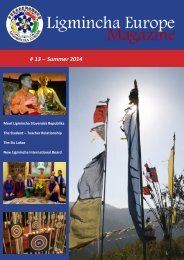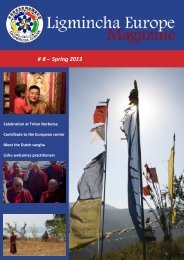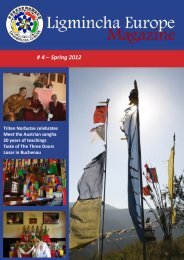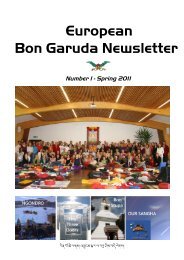12 Ligmincha Europe Magazine Spring 2014
European Magazine of the Ligmincha Sangha of Tenzin Wangyal Rinpoche.
European Magazine of the Ligmincha Sangha of Tenzin Wangyal Rinpoche.
Create successful ePaper yourself
Turn your PDF publications into a flip-book with our unique Google optimized e-Paper software.
ing place, without any conceptual step-by-step instructions<br />
on what to do. It is only expressed as<br />
getting more confidence in or getting familiar<br />
with the clear state of awareness the master has<br />
introduced one to, the Natural State.<br />
According to the Lopon there is no method we<br />
can use (5, p. 114):<br />
“There is no real method to use because it is unspeakable.<br />
If you follow what I am saying, words,<br />
then you won't find the natural state at all. You<br />
are listening to the outside, and you are just<br />
catching my words.”<br />
So, after this very distinctive Dzogchen ‘direct<br />
introduction’, there is still a gradual learning process<br />
of becoming more and more familiar with this<br />
unspeakable state of awareness and to experience<br />
it again and again, until you are quite advanced.<br />
The concept of this practice is easy to<br />
understand, but the practice itself is very difficult,<br />
because we are conditioned to reacting to all<br />
kinds of stimuli around us in daily life. We are<br />
very easily distracted, in contrast: you should not<br />
be distracted from the natural state of mind, not<br />
even for an instant. As Tenzin Wangyal Rinpoche<br />
puts it nicely (2, p. 96):<br />
“As Dzogchen practitioners, it is possible to get<br />
distracted while cooking, but not possible to get<br />
distracted from the natural state.”<br />
This ‘problem’ of instructions is clearly described<br />
in an interview by Henry M. Vyner of Lopon<br />
Tenzin Namdak Rinpoche (5, p. 110):<br />
“Interviewer: How do you concentrate into the<br />
natural state? On what do you focus your awareness?<br />
Lopon: There is nothing to do. Just leave it to itself.<br />
If you do something, if you try to do anything,<br />
then you are not in the natural state.<br />
Interviewer: So there is no method.<br />
Lopon: No. Just keep the natural state continuously.<br />
Interviewer: How do you stabilize the natural<br />
state?<br />
Lopon: Just do nothing.<br />
Interviewer: Just sit there with my eyes open?<br />
Lopon: No. That doesn't matter. It doesn't matter<br />
whether your eyes are open or closed or whether<br />
you lie down in your bed. If you are familiar with<br />
keeping the natural state, if you are quite advanced<br />
with this practice, then you can talk, or<br />
you can do everything without disturbing it.”<br />
The Interviewer then checks with the Lopon: his<br />
“Just do nothing” is not an instruction, but simply<br />
means “do nothing within your mind: you don't<br />
reject, accept or follow your thoughts.” It means,<br />
when looking into your ‘mind-stream’ you do not<br />
follow arising thoughts, because following<br />
thoughts causes more thoughts to arise. Not rejecting<br />
or accepting means: thoughts are allowed,<br />
and should be left untouched.<br />
Rinpoche and other Dzogchen masters warn us<br />
not to confuse meditation experiences or nyams:<br />
bliss, inner pleasure and emptiness, with the<br />
genuine experience of rigpa (2, p. 95):<br />
"However, these three nyams must not be<br />
confused with rigpa or with the primordial state.<br />
These are experiences that are comprehended by<br />
rigpa, the self-awareness of the state.”<br />
Also the blank state of ‘no thoughts’ is a meditation<br />
experience (4, p. 248):<br />
“This Natural State, which one encounters in contemplation,<br />
is characterized by an intrinsic Awareness<br />
or Rigpa, whereas the condition of ´no<br />
thoughts´ is just an experience (nyams) and in the<br />
absence of Rigpa, it does not constitute contemplation<br />
as such. It is not just emptiness that characterizes<br />
the state of Dzogchen, but equally this<br />
luminous clarity or Awareness.”<br />
Dzogchen contemplation has a different meaning<br />
than the usual Sutra or Tantra oriented meaning<br />
of contemplation (4, p. 248):<br />
The Teacher and the Dharma<br />
page<br />
32
















